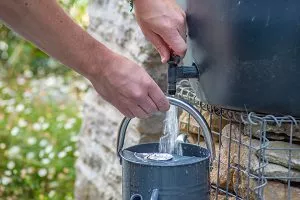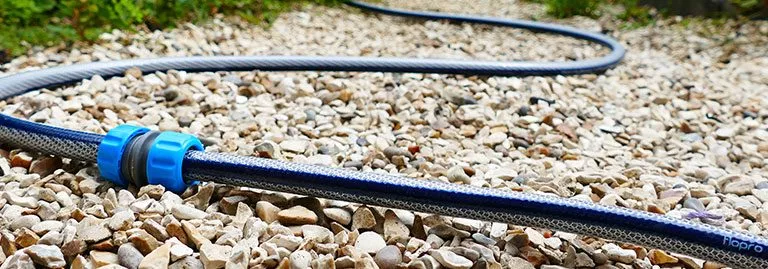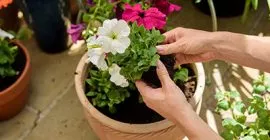Here at Flopro we want to take the stress and worry out of a potential hosepipe ban by running through what the ban would entail and how you can still keep your gardens looking beautiful without wasting water.
The current situation – There are currently no hosepipe bans or water restrictions in place in the UK – please check here for your local area restrictions: https://hosepipeban.org.uk/hosepipe-ban-current-situation/
Keep checking back on this page for updates. Last updated 28th September 2023.
What does a hosepipe ban really mean?
Don’ts
A hosepipe means you cannot use a garden hose or pressure washer, spray gun or sprinkler for domestic or allotment use while the restriction is in place. However, certain water suppliers have obtained temporary exemptions to use hosepipes for allotment use, so make sure to check with your supplier.
Anyone caught breaching a hosepipe ban would be committing an offence and could be fined up to £1,000. The legal response to breaking a hosepipe ban is outlined in the Water Industry Act 1991 section 76, as amended by the Flood and Water Management Act 2010.
What items are we banned from using in a hosepipe ban?
Under previous bans, hosepipe and sprinkler use have been banned, though watering cans, buckets, and drip irrigation are all acceptable forms of watering your garden.
Banned items:
- Watering a garden or domestic allotment
- Cleaning a private vehicle using a hosepipe
- Cleaning private leisure boat using a hosepipe
- Filling domestic swimming or paddling pools
- Drawing water using a hosepipe for domestic use
- Filling or maintaining a domestic pond using a hosepipe
- Filling or maintaining an ornamental fountain
- Cleaning walls, windows or other areas of a domestic premise using a hosepipe
- Using a hosepipe or pressure washer to clean paths, driveways or patios
- Cleaning artificial surfaces with a hosepipe
What can I use in a hosepipe ban?
You can, however, still water your garden so long as it is with a watering can, bucket, from a water butt or through using drip irrigation which on average saves between 70-90% of water compared with hand watering.
You can also use your hosepipe to water your lawn if it has been laid in the last 28 days.
Flopro and Kent & Stowe has a range of products that you can use during a ban. But why not use them all year around to save water and money while keeping your lawns, beds, borders, plants and vegetables thriving! Our Flopro SoakerFlo is a porous drip irrigation hose that slowly releases water for economical and precise watering.
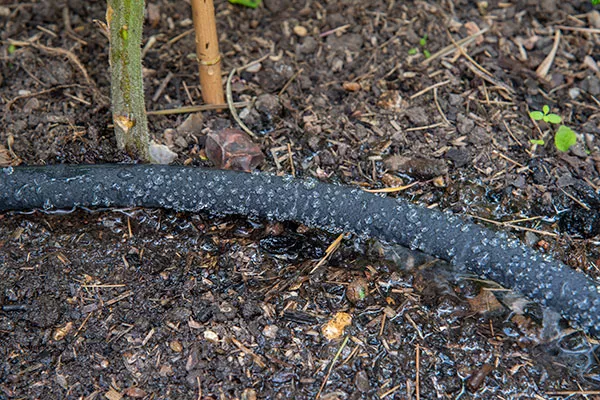
Watering Cans
Using watering cans is a good way to keep on top of garden watering, either by filling from your outside tap, or if you have one – a water butt. Using recycled rainwater is one the best thing you can use, but please bear in mind you aren’t able to refill your water butt with a hose during a ban, but you can use a hosepipe to fill a watering can.
The Flopro Can-Can is a great watering can to use as it connects directly to the hosepipe for easy, no mess filling. During a hosepipe ban, you can spend a lot of time walking back and forth to the tap to fill up your watering can. However the can-can solves that problem. You can fill your can anywhere in the garden – simply bring the hosepipe to you and fill up right next to your plants. This also means you can connect your hose pipe and leave it to fill up without having to hold it
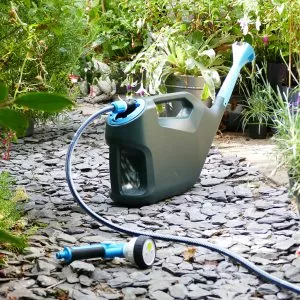
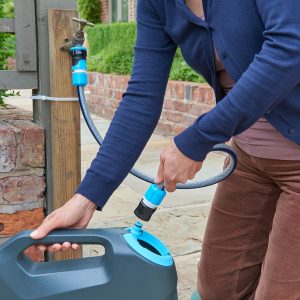
Another solution is to use ‘grey water’. The term grey water refers to essentially recycled water. It should be used with care, but very useful in times of water shortages. Your plants can be watered with paddling pool, shower, bath, kitchen and washing machine water (from rinse cycles). It will vary in quality depending on contaminants such as soap and detergent, but fortunately soil and potting composts are very effective at filtering them out. The residue can even act as a mild fertiliser.
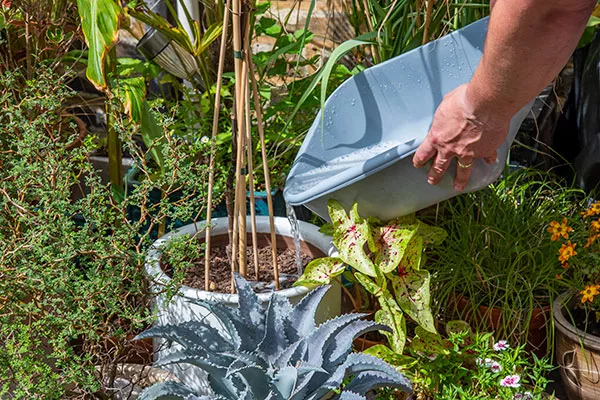
We would advise only saving water for 24 hours to avoid any bacteria growth. Apply with bucket and watering cans, or straight from the washing up bowl! Though we suggest not using this on edibles.
Is there a hosepipe ban in my area?
During a ban you should always check with your local water company to see if there are specific rules and restrictions in place. You can find your water supplier here and we have some of the main water companies below.
Anglian Water – http://www.anglianwater.co.uk/
South East Water – http://www.southeastwater.co.uk/
Southern Water – https://www.southernwater.co.uk/
Sutton and East Surrey Water http://www.waterplc.com/index.asp
Thames Water https://www.thameswater.co.uk/
Affinity Water https://www.affinitywater.co.uk/
How can I help to save water?
Affinity Water have offered the below advice –
- By turning the tap off when brushing your teeth, you can save over 6,500 litres of water per year.
- A bath can use up to 100 litres, a shower uses about a third of this. However, be aware – modern power showers can use more water than a bath if you shower for more than 5 minutes.
- Choose drought resistant bedding plants such as Alyssum, Geraniums, French and African Marigolds and Petunias or plant perennials such as Aquilegia, Campanula or Heuchera.
- A garden hose or sprinkler can use almost as much water in an hour as an average family of four uses in one day. Try and use a watering can instead to water your garden.
- The average roof collects about 85,000 litres of rain in a year! Make the most of the rain that falls during this dry period and install a water butt to help water your garden.
How to design your garden to withstand future droughts
With hot weather and droughts more likely for future summers, there are a few things you can do to help your garden cope.
Planting drought-resistant plants is a great starter. There are a number of plants that are able to withstand dry conditions once established, so think about planting some of these in your garden:
- Geum
- Sedum
- Agapanthus
- Lavender
- Catmint
- Salvia
- Begonia
- Heuchera
- Verbena
Adding organic matter, like Farmyard Manure, to the soil before planting helps to improve the water retention and nutrients available to the plants, helping it establish.
Mulch your garden well
Mulching has a number of benefits:
- Supresses weeds
- Adds nutrients to the soil
- Reduces water evaporation from the soil
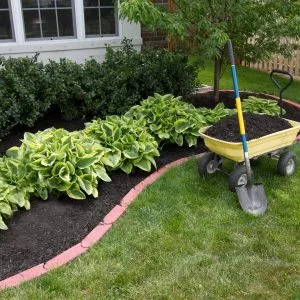
To mulch your garden, put a thick (5cm/2inches) layer of Westland Bed & Border Chipped Bark, Westland Composted Bark or Westland Farmyard Manure over all the beds and borders. You should do this in early spring and late winter, when there has been plenty of rainfall so the soil is soaked through.
Use Water Saving Gel
Water Saving Gel is a slow release moisture control for pots, containers and hanging baskets. You can mix it into your compost in summer in order to help the compost hold onto water. It is an advanced water retaining gel, with the capacity to hold 400 times its own weight in water and releases the water back into the compost as your plants require it. It reduces water stress in plants and helps to retain flowers during hot weather and rapid plant growth.
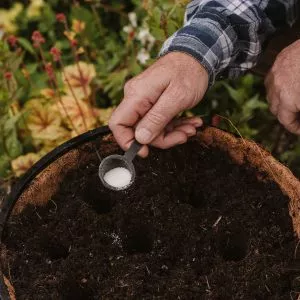
Take Advantage of Boost’s PlantSense Technology
Westland Boost All Purpose Plant Feed has PlantSense Technology to maximise water absorption. There is a wetting agent in Boost which reduces surface run off, helping the feed get into the soil evenly, without wasting water.
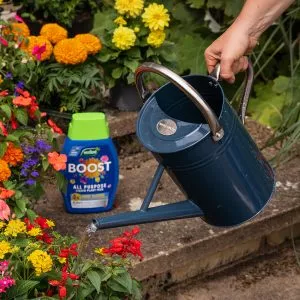
Add a water butt
You are still allowed to use water from your water butt during a hosepipe ban, so this can be an incredibly precious resource to have in your garden! Use this water to fill up your watering can and water your most vulnerable plants.
